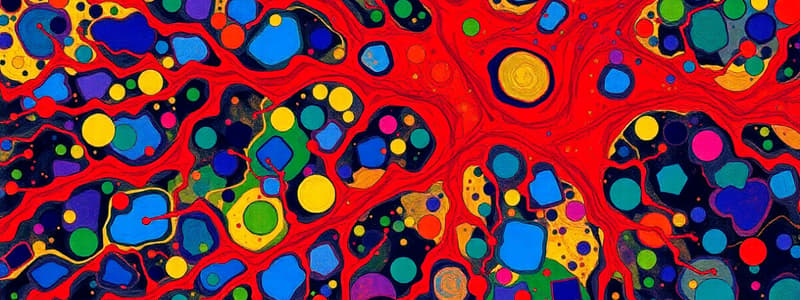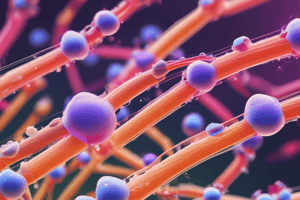Podcast
Questions and Answers
What is the primary structural composition of Chondroitin sulfate?
What is the primary structural composition of Chondroitin sulfate?
- D-Glucoronic acid + D-galactose
- D-Glucoronic acid + Galactosamine (correct)
- L-iduronic acid + Galactosamine
- D-Glucuronic acid + Glucosamine
Which GAG does NOT contain uronic acid?
Which GAG does NOT contain uronic acid?
- Keratan sulfate (correct)
- Chondroitin sulfate
- Heparin
- Dermatan sulfate
Which of the following GAGs is primarily responsible for maintaining corneal transparency?
Which of the following GAGs is primarily responsible for maintaining corneal transparency?
- Chondroitin sulfate
- Dermatan sulfate
- Hyaluronic acid
- Keratan sulfate I (correct)
What is a key function of Heparin in the body?
What is a key function of Heparin in the body?
Which GAG aggregates primarily in cartilage and plays a role in its compressibility?
Which GAG aggregates primarily in cartilage and plays a role in its compressibility?
Which GAG can be degraded by an enzyme known as hyaluronidase?
Which GAG can be degraded by an enzyme known as hyaluronidase?
Where is Heparan sulfate predominantly found?
Where is Heparan sulfate predominantly found?
Which of the following is NOT a known function of hyaluronic acid?
Which of the following is NOT a known function of hyaluronic acid?
Which GAG has multiple sulfate groups and is known for its role as an anticoagulant?
Which GAG has multiple sulfate groups and is known for its role as an anticoagulant?
In which type of connective tissue is Keratan sulfate II predominantly found?
In which type of connective tissue is Keratan sulfate II predominantly found?
What is one of the main functions of glycosaminoglycans in connective tissues?
What is one of the main functions of glycosaminoglycans in connective tissues?
Which glycosaminoglycan is specifically known for binding large amounts of water?
Which glycosaminoglycan is specifically known for binding large amounts of water?
What outcomes are associated with hereditary enzyme deficiencies related to glycosaminoglycans?
What outcomes are associated with hereditary enzyme deficiencies related to glycosaminoglycans?
Which of the following symptoms is NOT typically associated with mucopolysaccharidosis?
Which of the following symptoms is NOT typically associated with mucopolysaccharidosis?
What structural feature do glycosaminoglycans possess that contributes to their function?
What structural feature do glycosaminoglycans possess that contributes to their function?
What is the primary function of the hyaluronidase enzyme present in semen?
What is the primary function of the hyaluronidase enzyme present in semen?
Which of the following characteristics is unique to hyaluronic acid compared to other glycosaminoglycans (GAGS)?
Which of the following characteristics is unique to hyaluronic acid compared to other glycosaminoglycans (GAGS)?
What type of genetic inheritance is primarily associated with mucopolysaccharidoses (MPS)?
What type of genetic inheritance is primarily associated with mucopolysaccharidoses (MPS)?
What enzyme deficiency is responsible for Hurler's syndrome?
What enzyme deficiency is responsible for Hurler's syndrome?
Which of the following features is NOT associated with dysotosis multiplex?
Which of the following features is NOT associated with dysotosis multiplex?
What distinguishes Hunter's syndrome from Hurler's syndrome?
What distinguishes Hunter's syndrome from Hurler's syndrome?
What is a common consequence of the accumulation of glycosaminoglycans in mucopolysaccharidoses?
What is a common consequence of the accumulation of glycosaminoglycans in mucopolysaccharidoses?
What enzyme deficiency is implicated in the structural abnormalities and mental retardation observed in the 5-year-old boy?
What enzyme deficiency is implicated in the structural abnormalities and mental retardation observed in the 5-year-old boy?
How does Sanfilipo's syndrome primarily manifest in affected individuals?
How does Sanfilipo's syndrome primarily manifest in affected individuals?
Which of the following is not a known feature of mucopolysaccharidoses?
Which of the following is not a known feature of mucopolysaccharidoses?
Which class of biomolecules primarily provides structural support in the extracellular matrix (ECM)?
Which class of biomolecules primarily provides structural support in the extracellular matrix (ECM)?
What is a significant consequence of GAGS accumulation in mucopolysaccharidoses?
What is a significant consequence of GAGS accumulation in mucopolysaccharidoses?
What type of sugar forms the repeating disaccharide units in glycosaminoglycans (GAGs)?
What type of sugar forms the repeating disaccharide units in glycosaminoglycans (GAGs)?
What is one major function of glycosaminoglycans in the extracellular matrix?
What is one major function of glycosaminoglycans in the extracellular matrix?
Which of the following is NOT a component of the extracellular matrix?
Which of the following is NOT a component of the extracellular matrix?
Which of the following statements correctly describes glycosaminoglycans?
Which of the following statements correctly describes glycosaminoglycans?
What type of cells secrete the extracellular matrix components?
What type of cells secrete the extracellular matrix components?
Which glycosaminoglycan is primarily associated with forming proteoglycans?
Which glycosaminoglycan is primarily associated with forming proteoglycans?
What is the enzyme defect responsible for Hurler's Syndrome?
What is the enzyme defect responsible for Hurler's Syndrome?
Which mucopolysaccharidosis is associated with the accumulation of keratan sulfate?
Which mucopolysaccharidosis is associated with the accumulation of keratan sulfate?
What symptom is not typically associated with MPS I (Hurler Syndrome)?
What symptom is not typically associated with MPS I (Hurler Syndrome)?
Which of the following mucopolysaccharidoses is X-linked?
Which of the following mucopolysaccharidoses is X-linked?
The lack of which enzyme is responsible for Sanfilippo's Syndrome?
The lack of which enzyme is responsible for Sanfilippo's Syndrome?
Which of the following statements regarding Mucopolysaccharidosis III (Sanfilippo Syndrome) is correct?
Which of the following statements regarding Mucopolysaccharidosis III (Sanfilippo Syndrome) is correct?
What type of structural changes are common in MPS I (Hurler Syndrome)?
What type of structural changes are common in MPS I (Hurler Syndrome)?
Which mucopolysaccharidosis results from a defect in N-acetylglucosamine-4-sulfatase?
Which mucopolysaccharidosis results from a defect in N-acetylglucosamine-4-sulfatase?
How does heparan sulfate affect tumor cell behavior?
How does heparan sulfate affect tumor cell behavior?
What is the primary consequence of GAG accumulation in mucopolysaccharidosis?
What is the primary consequence of GAG accumulation in mucopolysaccharidosis?
Flashcards
Glycosaminoglycans (GAGs)
Glycosaminoglycans (GAGs)
Large, negatively charged polysaccharide chains found in the extracellular matrix, providing a gel-like structure.
Extracellular Matrix (ECM)
Extracellular Matrix (ECM)
A mesh of proteins and GAGs that provides structural support and biochemical signals to cells.
GAG Structure
GAG Structure
Long, unbranched chains of repeating disaccharide units (amino sugar + uronic acid).
GAG function
GAG function
Signup and view all the flashcards
ECM components
ECM components
Signup and view all the flashcards
Proteoglycans
Proteoglycans
Signup and view all the flashcards
Disaccharide units
Disaccharide units
Signup and view all the flashcards
Uronic acid
Uronic acid
Signup and view all the flashcards
Chondroitin Sulfate
Chondroitin Sulfate
Signup and view all the flashcards
Keratan Sulfate (KS)
Keratan Sulfate (KS)
Signup and view all the flashcards
Heparin
Heparin
Signup and view all the flashcards
Dermatan Sulfate
Dermatan Sulfate
Signup and view all the flashcards
Heparan Sulfate
Heparan Sulfate
Signup and view all the flashcards
Hyaluronic Acid
Hyaluronic Acid
Signup and view all the flashcards
GAG (Glycosaminoglycans)
GAG (Glycosaminoglycans)
Signup and view all the flashcards
Hyaluronidase
Hyaluronidase
Signup and view all the flashcards
Collagen
Collagen
Signup and view all the flashcards
GAGs
GAGs
Signup and view all the flashcards
GAG Types
GAG Types
Signup and view all the flashcards
GAGs and Hereditary Disorders
GAGs and Hereditary Disorders
Signup and view all the flashcards
Mucopolysaccharidoses (MPS)
Mucopolysaccharidoses (MPS)
Signup and view all the flashcards
Hyaluronidase's role in fertilization
Hyaluronidase's role in fertilization
Signup and view all the flashcards
Hyaluronic acid vs. other GAGS
Hyaluronic acid vs. other GAGS
Signup and view all the flashcards
MPS cause
MPS cause
Signup and view all the flashcards
MPS symptoms
MPS symptoms
Signup and view all the flashcards
Hurler's syndrome (MPS I)
Hurler's syndrome (MPS I)
Signup and view all the flashcards
Hunter's syndrome (MPS II)
Hunter's syndrome (MPS II)
Signup and view all the flashcards
Sanfilipo syndrome (MPS III)
Sanfilipo syndrome (MPS III)
Signup and view all the flashcards
Dysostosis Multiplex
Dysostosis Multiplex
Signup and view all the flashcards
Inheritance Pattern (MPS)
Inheritance Pattern (MPS)
Signup and view all the flashcards
Hurler Syndrome
Hurler Syndrome
Signup and view all the flashcards
Hunter Syndrome
Hunter Syndrome
Signup and view all the flashcards
Sanfilippo Syndrome
Sanfilippo Syndrome
Signup and view all the flashcards
Morquio Syndrome
Morquio Syndrome
Signup and view all the flashcards
What is the role of Hyaluronic Acid in Cancer?
What is the role of Hyaluronic Acid in Cancer?
Signup and view all the flashcards
What is the role of Heparan Sulfate in Cancer?
What is the role of Heparan Sulfate in Cancer?
Signup and view all the flashcards
What are GAGs?
What are GAGs?
Signup and view all the flashcards
How do Chondrodystrophies affect the body?
How do Chondrodystrophies affect the body?
Signup and view all the flashcards
Study Notes
Extracellular Matrix (ECM)
- ECM is a collection of extracellular molecules secreted by cells.
- It provides structural and biochemical support to surrounding cells.
- Composition of ECM varies between multicellular structures.
- Functions include cell adhesion and cell-to-cell communication.
Glycosaminoglycans (GAGs)
- GAGs are large complexes of negatively charged heteropolysaccharide chains.
- They have a special ability to bind large amounts of water.
- GAGs produce a gel-like matrix, forming the basis of the body's ground substance surrounding cells.
Composition of ECM
- ECM is composed of structural proteins, specialized proteins, and proteoglycans.
- Structural proteins include collagen and elastin.
- Specialized proteins include fibrillin, fibronectin, and laminin.
- Proteoglycans are a compound of protein bonded to a mucopolysaccharide group.
Functions of ECM
- Binding and packing of tissues (connective tissue proper)
- Connecting, anchoring, and supporting the body and organs.
- Transport of metabolites between capillaries and tissues.
- Essential for processes like growth, wound healing, and fibrosis.
- Defense against infection.
- Repair of injury via cell proliferation and fiber formation.
- Fat storage (linked to age, sex, nutrition, and disease).
- Role in development, inflammatory states, and cancer cell spread.
Functions of GAGs
- Major component of the extracellular matrix.
- Form a gel-like matrix, acting as a cushion.
- Attract water and increase viscosity.
- Lubricate joints.
- Provide flexibility and elasticity to cartilage.
Classification of GAGs
- GAGs are classified as sulfate-free (e.g., hyaluronic acid) and sulfate-containing (e.g., chondroitin sulfate, keratan sulfate, heparin, and heparan sulfate, dermatan sulfate).
Specific GAG examples
- Hyaluronic acid: Sulfate-free, important component of synovial fluid, vitreous humor, and connective tissues.
- Chondroitin sulfate: Found in cartilage.
- Keratan sulfate: Found in the cornea and loose connective tissues.
- Heparin: Intracellular, functions as an anticoagulant and lipoprotein lipase activator.
- Heparan sulfate: A component of basement membranes and cell surfaces.
- Dermatan sulfate: Found in skin, cardiac valves, and blood vessels.
Mucopolysaccharidoses (MPS)
- Rare inborn errors in the degradation of glycosaminoglycans
- Hereditary disorders (usually autosomal recessive, except for MPSII which is X-linked)
- Lysosomal hydrolases for GAGs are deficient.
- GAGs accumulate, leading to symptoms such as skeletal and extracellular matrix deformities, and mental retardation.
Examples of MPS diseases
- Hurler syndrome (MPS I): Deficiency in α-L-iduronidase activity.
- Hunter syndrome (MPS II): Deficiency in iduronate-2-sulfatase activity.
- Sanfilippo syndrome (MPS III): Deficiency in one of the four enzymes needed to break down heparan sulfate.
- Morquio syndrome (MPS IV): Deficiency in galactosamine-6-sulfatase, or N-acetylgalactosamine-6-sulfatase leads to accumulation of keratan sulfate.
- Scheie syndrome (MPS I): milder form of Hurler syndrome.
- Maroteaux-Lamy syndrome (MPS VI): Deficiency in N-acetylgalactosamine-6-sulfatase.
- Sly syndrome (MPS VII): Deficiency in β-glucuronidase.
Dysotosis Multiplex
- Severe abnormalities in the development of cartilage and bone (chondrodystrophic skeletal changes)
- Deposition of a lipid-like substance in various tissues.
Association of GAGs with Cancer
- Increased production of hyaluronic acid frequently observed in tumor cells.
- Lower heparan sulfate levels associated with a lack of adhesiveness in some tumor cells.
Studying That Suits You
Use AI to generate personalized quizzes and flashcards to suit your learning preferences.




